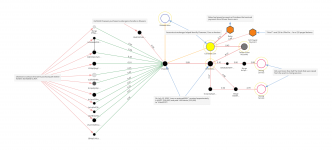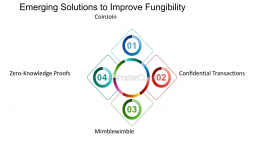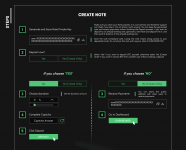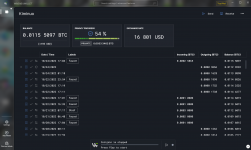d0ctrine
Diamond
- Joined
- 17.08.24
- Messages
- 107
- Reaction score
- 4,189
- Points
- 93

Welcome back privacy-conscious carders. In Part 1 we rolled up our sleeves and got deep into the nitty-gritty of node poisoning and wallet hardening arming you with the knowledge to protect your digital assets from prying eyes. Now its time to take your privacy game to the next level by making your coins vanish without a trace. This aint your grandpas wallet privacy—were talking transaction-level disappearances.
Every transaction you make on the Bitcoin network leaves a permanent un-fucking-deletable digital fingerprint that screams "FOLLOW ME!" to anyone watching. And heres what keeps me up at night - that shit stays there FOREVER. Even if youre just starting out small time every single transaction from your noob days gets etched into the blockchain like a digital tattoo. So when you eventually level up and start moving serious weight law enforcement can trace it ALL back - from your first stumbling $50 cashout to your latest six-figure operation.
Think about it - your entire criminal evolution is documented on an immutable public ledger. When youre moving funds from carding to BTC these eternal fingerprints expose everything - your drops your cashout patterns your growth from amateur to pro. The blockchain analysis companies that banks and feds use arent just looking at your current moves - theyre digging through your entire fucking history. They can trace your coins from day one connecting your rookie mistakes to your current operation with surgical precision.
This permanent record creates a massive problem: Bitcoin isnt naturally private. Each coin carries its entire transaction history like a criminal record that never gets expunged. This brings us to a critical concept in cryptocurrency privacy: fungibility.
Fungibility means that every unit of currency should be equal and interchangeable. Take cash - one $100 bill is as good as any other $100 bill. Nobody gives a fuck where that bills been or what it was used for before. But Bitcoin? Each coin is unique and traceable carrying its entire history like a snitch wearing a wire. Bitcoiners pretend its fungible but unless you mix coins it couldnt be further from the truth.
This lack of fungibility means your "dirty" bitcoins - ones linked to carding or fraud - are fundamentally different from "clean" ones. Exchanges can blacklist your coins making them worthless for cashout. Law enforcement can track them through every transaction. Your coins essentially become marked bills broadcasting your activities to anyone who knows where to look.
This is where Bitcoin mixers come in - theyre the digital equivalent of money laundering designed to break the chain of custody and restore fungibility to your coins. Think of them as industrial-strength washing machines for your dirty crypto. You throw in your marked bills and out come clean ones with no connection to your original activities.
A mixer works by pooling your coins with those of hundreds or thousands of other users shuffling them around in a complex dance of transactions then spitting out completely different coins to a new address. When done right its practically impossible to connect your input coins to your output coins - the trail goes cold.
Not all mixers are created equal. Youve got two main flavors to choose from:
Centralized Mixers:
These are the OG mixing services - simple straightforward but requiring trust in the operator. You send your coins to their address they mix them with other users funds and send you back different coins minus a fee. The downside? Youre putting your trust in a third party who could potentially scam you or keep records that could be seized.
Heres a list of some active centralized mixers as of 2024. But remember - this shit changes faster than a chameleon on cocaine. Any of these services could exit scam tomorrow and vanish with your coins. ALWAYS do your own research before trusting ANY mixer with your funds.
| Mixer | Min Amount | Max Amount | Fee Range |
|---|---|---|---|
| Mixer.money | 0.0007₿ | 0.003₿ | 4-5% |
| Mixtum | 0.0007₿ | 0.005₿ | 4-5% |
| Coinomize | 0.0003₿ | 0.003₿ | 1-5% |
| Anonymixer | Variable | 0.001₿ | 1-2% |
| Webmixer | Variable | 0.001₿ | 1-5% |
| Mixtura.money | 0.0007₿ | Variable | up to 5% |
| Mixero | 0.0003₿ | 0.002₿ | 0.7-4.7% |
| BitMixer.online | 0.0007₿ | 0.003₿ | 1-5% |
| JokerMix | None | 0.001₿ | 2% |
| SwampLizard | 0.0007₿ | 0.003₿ | 4-5% |
CRITICAL WARNING: The mixer industry is volatile as fuck - services appear and disappear daily. Some are legit some are honeypots and some are straight-up scams waiting to happen. Never trust any mixer blindly no matter how established they seem. Start with small test amounts verify their reputation across multiple sources and ALWAYS assume they could disappear with your coins at any moment.
Remember: A mixer thats trusted today could be compromised tomorrow. The feds are constantly pressuring these services to either shut down or hand over user data. If youre moving serious weight use multiple mixers and cross-chain techniques instead of putting all your trust in one service.
Decentralized Mixers (CoinJoin):
These are the new school - no trust required. CoinJoin protocols let multiple users collaborate to mix their coins in a single transaction with no central operator who could fuck you over. Its like a digital flash mob where everyone throws their coins in the air and catches someone elses making it impossible to tell who ended up with what.
Here are some battle-tested CoinJoin implementations that wont leave you exposed:
- Wasabi Wallet - Desktop wallet with built-in CoinJoin. Minimum mix amount 0.1 BTC. Coordinator fee around 0.3%. Solid privacy features but requires decent volume to participate.
- Sparrow Wallet - Desktop wallet supporting both Whirlpool and native CoinJoin. Clean interface with advanced features for power users.
CoinJoin is more than just a mixing protocol—its a middle finger to the surveillance state. Imagine a digital mosh pit where everyone throws their coins into the air and catches someone elses. The result? A transaction thats practically impossible to trace back to you.
Using CoinJoin through a wallet like Wasabi is straightforward:
- Load up your wallet with the coins you want to mix.
- Set your mixing parameters like the number of participants and the fee.
- Join the mix and watch as your coins are shuffled around in a digital dance of anonymity.
If youre just starting out moving a few hundred or couple thousand in BTC basic mixing will do the job. No need to go full paranoid mode when youre small potatoes. But for you heavy hitters moving serious volume? You need the advanced shit. Heres how the big boys (from shop owners to ransomware operators) move their money:
- Chain Different Privacy Techniques: Stack your security by running coins through a centralized mixer then CoinJoin then another mixer. This triple-layer approach is overkill for small timers but when youre moving weight its essential protection.
- Cross-Chain Anonymity: For high-value moves convert your BTC to Monero let it sit then back to fresh bitcoins. Its expensive and complex but when youre dealing with serious money the extra cost is worth dodging heat.
- Time-Based Separation: Mix your large amounts now then sit on them for weeks before moving again. Small timers can skip this waiting game but major players need that time buffer to break forensic analysis.
Even the most well-intentioned privacy enthusiasts can stumble into common pitfalls:
- Timing Patterns: Mixing your coins and then immediately withdrawing them is like painting a target on your back. The correlation is too obvious and its easy for analysts to piece together the puzzle.
- Amount Matching: Moving exact amounts is another surefire way to get caught. If you mix 10 BTC and then immediately send 10 BTC to an exchange its like drawing a line connecting the two transactions with a highlighter.
- Poor OPSEC: All the mixing in the world wont help if youre using your home IP address or linking your transactions to your real identity. OPSEC (Operational Security) is everything. Consult my other guides to get enlightened more on general OPSEC practices.
Always remember: Privacy isnt a product—its a process. Each layer of obfuscation adds another wall between your coins and the prying eyes of the world. But remember one mistake can unravel the entire operation. And heres the brutal truth: while your career doing fraud might be temporary the digital footprints you leave behind are permanent. The blockchain never forgets—every transaction every pattern every mistake gets etched into an immutable ledger that will outlive your whatever method youre doing right now.
In Part 3 well dive into the world of blockchain forensics and how to stay one step ahead of the game. Until then keep your coins clean your transactions private and your tracks covered. In this game paranoia isnt just healthy—its necessary. d0ctrine out.









